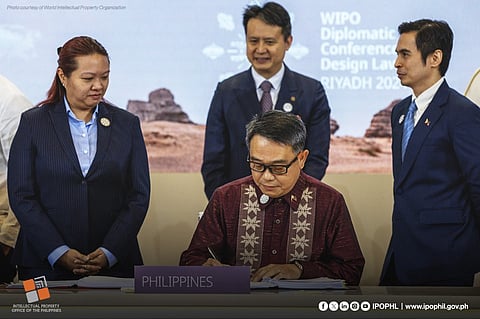
- NEWS
- the EDIT
- COMMENTARY
- BUSINESS
- LIFE
- SHOW
- ACTION
- GLOBAL GOALS
- SNAPS
- DYARYO TIRADA
- MORE

Ending 20 years of multilateral negotiations, the Philippines, along with 193 member states under the World Intellectual Property Organization (WIPO), has signed the adoption of the Riyadh Design Law Treaty (DLT). The treaty establishes an international framework that streamlines, standardizes, and modernizes rules on design protection.
“Together with the WIPO Member States, the Philippines shares the common goal that designers should be able to protect their work more easily and be given the bigger opportunity to scale up globally,” said IPOPHL Director General Rowel Barba, representing the country in sealing the treaty last 22 November in Saudi Arabia.
The DLT aims to create a predictable and cost-efficient design application process by limiting application requirements and allowing applicants flexibility, including the option to file multiple designs in one application and to represent designs in various formats such as drawings, photographs, or videos where permissible.
The treaty also introduces minimal filing date requirements, a 12-month grace period for disclosures, a six-month option to keep designs unpublished from the filing date, relief for missed deadlines, simplified renewal procedures, and the promotion of e-filings and digital processes—measures designed to reduce pain points in applications that could lead to the loss of rights.
Barba emphasized the significance of the treaty in light of the Philippines’ focus on its creative economy under President Ferdinand Marcos Jr.’s leadership.
“The goals of the Riyadh Design Law Treaty complement current efforts and long-term plans of the current administration in promoting and developing creative and innovative industries. This is especially important for developing and middle-income countries like ours, as it would aid us in our aspiration to achieve the 2030 Sustainable Development Goals. as well as our very own Philippine Development Plan 2023-2028,” Barba added.
Barba lauded the conference president and CEO of the Saudi Authority for Intellectual Property (SAIP), Abdulaziz Muhammad Al-Suwailem, for his exceptional leadership in navigating tough and intensive two-week negotiations to secure an agreement among member states.
“Your dedication and trust in the process was felt throughout the conference that led us to a meaningful, consensus-driven and balanced outcome in the draft text,” Barba said in his closing message.
Barba also extended his gratitude to WIPO, led by Director General Daren Tang, and the entire organizing team of the Diplomatic Conference, including committee presidents, officers, and the Saudi government, particularly SAIP.
This marks the second multilateral treaty adopted by WIPO member states this year. In May, consensus was reached on the WIPO Treaty on Intellectual Property, Genetic Resources, and Associated Traditional Knowledge.
“The Philippines reaffirms its commitment to continued collaboration with the international community to ensure the successful implementation of the historic treaties we have worked on in advancing design protection and inclusive innovation,” Barba emphasized.
